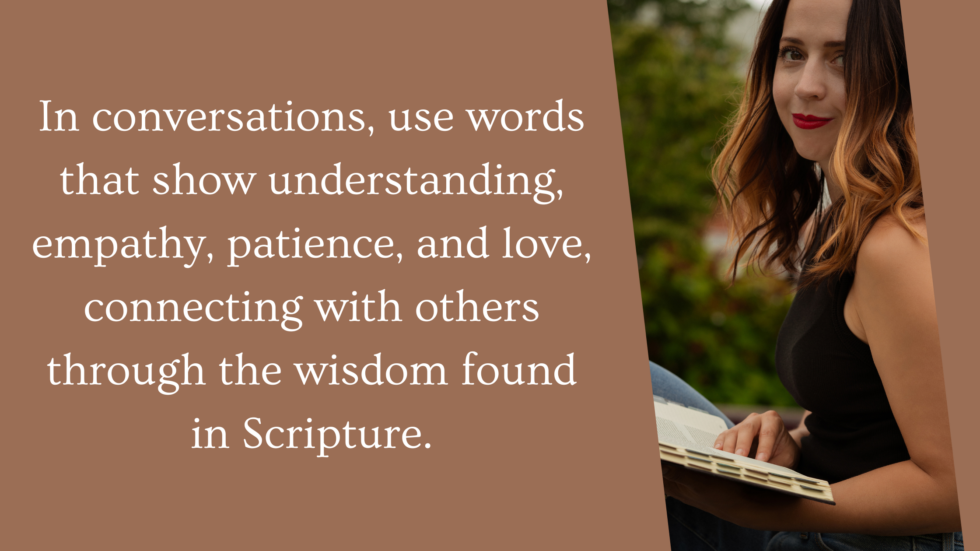Have you ever been in a conversation and thought to yourself, “What is the point?” You may think they don’t understand you, or maybe you don’t understand them. (Although desiring to have a healthy conversation, it feels like no one understands what you are saying.)
When was the last time you were in a conversation and just wanted to give up?
Have you ever thought about the lens through which your topic of conversation is blurry because of the pain and experiences you have had in this life?
I want to help guide you in your conversations so you can learn how to have a healthy conversation (even when you don’t agree).
Something important to remember: We run on love as a car runs on fuel.
By the way, what if I told you your feelings aren’t inherently bad or sinful? You don’t need to fear or suppress them. They can be a guide. If you’re interested, I have a free 3-day study on living by faith while processing emotions. Check it out here!
What Does a Healthy Conversation Need
A healthy conversation thrives on compassion, empathy, and open-mindedness. To connect genuinely, it’s crucial to listen carefully, understanding not only the words but also the emotions expressed. Compassion forms the basis for appreciating diverse perspectives without judgment.
Respectful communication involves recognizing the validity of others’ feelings and experiences, even when they differ. A healthy conversation requires being open and sharing authentically, creating a safe space where everyone feels heard and valued. In this supportive environment, ideas can be freely exchanged, fostering understanding. Ultimately, a healthy conversation is about compassionately exchanging thoughts and feelings and building bridges of understanding that go beyond differences.
A few qualities a healthy conversation needs:
- Humility
- Quick to listen
- Slow to speak
- Seek to understand but not necessarily agree
- Love and truth are at the center
Healthy conversations don’t mean there isn’t conflict. A healthy conversation is willing to work through the conflict, ensuring both parties are heard and understood.
How to Have a Healthy Conversation According to Scripture
A biblically based approach to having a healthy conversation is rooted in the teachings of love, patience, and humility found in the Bible. The book of Proverbs emphasizes the importance of listening and being slow to speak (Proverbs 18:13, James 1:19), encouraging us to seek understanding before responding.
Ephesians 4:29 guides conversations to be filled with words that build others up, avoiding negative or harmful speech. The Bible also teaches the value of empathy, urging believers to “rejoice with those who rejoice, weep with those who weep” (Romans 12:15). Additionally, Matthew 18:15 guides us in resolving conflicts privately and respectfully.
Ultimately, the biblical foundation for a healthy conversation centers on love, humility, patience, and a commitment to building others up through our words and actions.
Here’s a list of biblical principles for having a healthy conversation, followed by a brief explanation of each:
Listen Actively (Proverbs 18:13, James 1:19): Encourages being slow to speak and quick to listen, emphasizing the importance of understanding before responding. Active listening promotes a thoughtful and considerate exchange of ideas.
Speak Edifying Words (Ephesians 4:29): Guides conversations to be filled with words that uplift and encourage. This principle encourages believers to choose words that build others up rather than tearing them down, fostering a positive and constructive dialogue.
Practice Empathy (Romans 12:15): Urges believers to share in the emotions of others, rejoicing in their joys and sympathizing in their sorrows. Empathy fosters a deeper connection, promoting understanding and compassion in conversations.
Resolve Conflicts Privately (Matthew 18:15): Provides guidance on addressing disagreements by first seeking resolution privately. This principle emphasizes the importance of maintaining respect and confidentiality in conflict resolution, promoting a healthy and reconciling approach.
A more in-depth explanation of each one on having a healthy conversation:
Listen Actively: Actively listening involves giving full attention to the speaker, seeking to understand their perspective without immediately formulating a response. This approach allows for a more thoughtful and empathetic exchange of ideas.
Speak Edifying Words: Ephesians 4:29 encourages believers to use words that contribute positively to a conversation, promoting understanding and unity. This principle discourages gossip, negativity, or any form of speech that might harm relationships.
Practice Empathy: Romans 12:15 encourages believers to engage emotionally with others. By sharing in their joys and sorrows, individuals can cultivate a deeper understanding of one another and build a more compassionate and supportive community.
Resolve Conflicts Privately: Matthew 18:15 guides believers in handling conflicts discreetly and respectfully. This principle promotes a healthy resolution process, emphasizing reconciliation and maintaining the dignity of those involved in the conversation.
Note: Men and women typically communicate in different ways. Men may think more analytically. Women may think more emotionally. To have a healthy conversation, seek to understand where they are coming from.
5 Tips To Have A Healthy Conversation
1. Get to the point. Learn to share what you are really feeling and experiencing versus beating around the bush, hoping they figure out what we are trying to say. Be direct. Be honest. Replace “You” language with “I” language. This is not a time to pass blame. Blame causes defenses to go up and listening to go down.
“You make me feel”
“If you did this”
Sharing honestly is not about blaming anyone but fully expressing the issue from both perspectives, which creates an atmosphere for healthy conversations to exist.
(Sometimes, we need to go first and begin to heal with the Lord emotionally. My book Face Off with Your Feelings walks you through how to process all of your feelings with God.)
Passive-aggressive communication is like a tick. A tick slowly digs its way into our skin until its whole body is immersed and causes problems. Not sharing or being direct becomes a slow and painful process of keeping everything in, which eventually festers within us and causes more damage.
2. Focus on the issues, not the person. Sometimes we get so caught up belittling the other person because of how they made us feel that we never get to the root of the issue.
If we desire to have healthy conversations, we will want to address how to solve the problem, not fix the other person.
3. Listen to their side. One of the hardest things for us to do is hear how we hurt someone, did something wrong, or messed up. We want to run from the pain because the enemy tries to lead us right into shame. When both sides are heard is where compassion and understanding meet. When both sides are expressed is where we have a starting point for resolution and develop healthy conversations.
To be clear, understanding does not mean agreement. However, understanding does not mean we agree with what they are saying but that we hear what they are saying and why they came to the conclusion they have.
We cannot go into a conversation wanting to be right and to be heard (or to have our point right).
If we do, we neglect to hear what the other person is experiencing. Therefore, we lose the opportunity to get to the bottom of it. Whether we are right or wrong, we get to practice being “quick to listen, slow to speak and slow to become angry, because human anger does not produce the righteousness that God desires.” (James 1:19-20)
4. Be clear to hear. What we hear and what someone else says can be two different things. When we are talking with someone, a good habit to have is to repeat what the other person is saying to us. Paraphrase their words and ask them if what you said was correct. That way, we are not assuming what they said but confirming what they said and creating space for a healthy conversation.
5. Communication style and boundaries. Everyone communicates differently based on how they were taught or the level of pain, or their experiences. Pay attention to the words they use, and be sure not to be easily offended. Therefore, boundaries need to be in place, so there is mutual respect. Some people are ready to talk about things right away, and others need a few days to process.
Know What You Need to Have a Healthy Conversation
If someone brings up something from our past, not dealing with the current situation, we can kindly repoint them back to the truth without going into our past. (This is especially important for people we do not know or have a working relationship with.)
Another example is if we have forgiven someone for a wrong, whatever they did is forgiven and in the past. We can not continue to bring up their past forgiveness to prove our point in the present moment. This can make it hard to have a healthy conversation when we continue to hold things against people.
Does God do that with us?
Final notes: Stay committed and connected. Every relationship will look different. When things come up, shutting down is easier than having a conversation. People are worth fighting for.






Good Morning Jessica Hottle,
I really enjoy healthy conversations. I had a good time reading what you wrote. I am going to practice what I preach and honor my commitments. Thank You.
Sincerely Your Friend,
Scott Rosenstein
This was very healthy for me. I can now release some stress. Thank you and many blessings